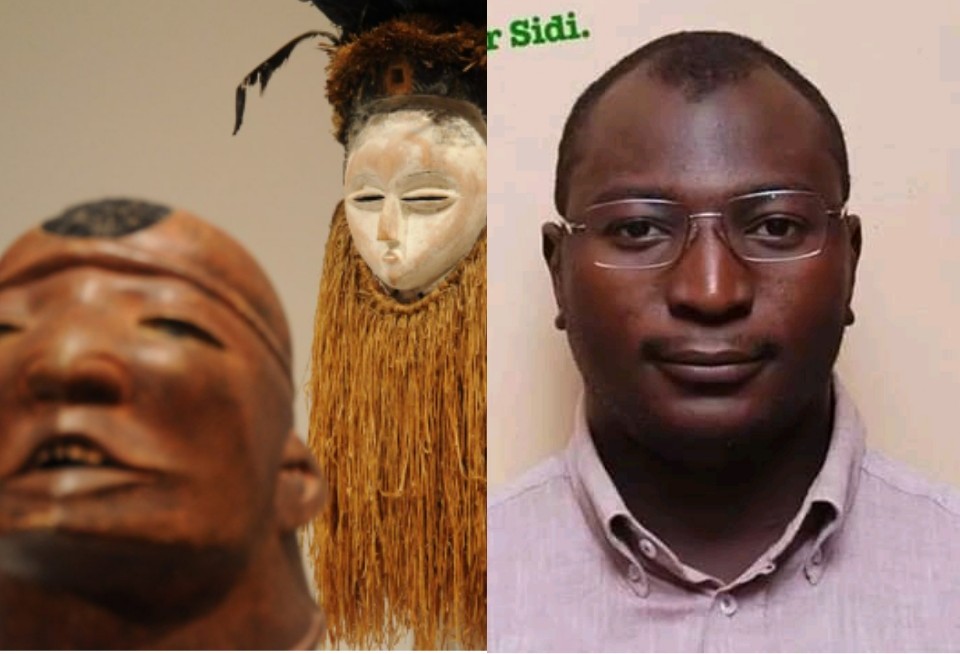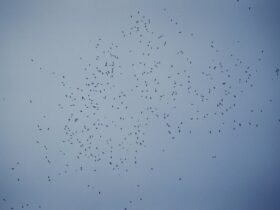I began yesterday to read Sidi’s new poems published by LOLWE but I couldn’t find poetry in the many sentences that I read. I continued the reading today asking myself where the poetry in Sidi is in the poems that I was reading? Then, it dawned on me that poetry has lost its name; it is now prose-poetry or pseudo-poetry. Poetry has lost its nuances and the magisterial opulence of its language. Poetry has been redefined and in this new definition, poetry is simply the rendering of words and feelings in segregated forms or sometimes it comes in the form of an unsegmented passage like an unending paragraph in a badly written novel.
Sidi is not a confessional poet, this fact must not be mistaken, he is a meta-poet fascinated with the definitive which accounts for his didactic poetics. The penchant of meta-poetics is to instruct, to teach the craft of the art.
Although the great American poetic tradition is in vogue currently, its loose or watery style rooted in confessionism has caught up with the African audience and poets. However, one of the grand pioneers of the American tradition, Walt Whitman in his classical work, “Leaves of Grass” presents us with an enigmatic epitomisation of what that tradition truly represents. Beyond its loose style, Whitman shows us that it can be a source of profound expression too; I am a free companion… I bivouac by invading watch fires.
The influence of the American style on African and, especially Nigerian poetry has become so generic that many do not even recognise its presence or influences as exogenous. What is of concern is its bastardization by a generation without a sense of tradition. Sylvia Plath is another sterling example of the American confessionist tradition, in whose works one encounters the aesthetization of pain and the individual.
Of course, confessional poetry is about the romanticization of individualized realities, sexuality, psyche and isolated experiences such as could be seen in the works of new Nigerian poets like Saddiq Dzukogi and Romeo Oriogun who are among the leading light of African poets today. Although, very little attention is often paid to the tragic consequences of confessional poetry such as the suicidal thoughts and dystopia that it fosters in the poet and reader.

Back to Sidi. I continue my reading or misreading of his poems. I am searching for that single line in “Gathering of Spirits” that would resonate and strike me as a thoughtful punctuation of our proselytism. I am quite aware that I might be mistaken for a hater, because that is the new normal propagated by a large percent of the new generation of writers who are largely suffering from cognitive dysfunction which disallows them from engaging in any critical reading outside of their recycled confessions and premature intellectual ejaculation applauded by a mercantile prebendalism. But, Sidi is not a confessional poet, this fact must not be mistaken, he is a meta-poet fascinated with the definitive which accounts for his didactic poetics. The penchant of meta-poetics is to instruct, to teach the craft of the art. This is the subject that runs through most of Sidi’s poems especially in his first collection, The Poet of Dust.
But should a critic be afraid of what the artist thinks, or how she would feel about his interrogation of trends or a piece of art? No, the critic is not necessarily a friend or enemy of the artist, the critic’s loyalty is to the arts; to the society and in upholding its tenets.
This style is drawn from his immersion in the meta-cognitive works of the Persian poet and thinker, Jalāl ad-Dīn Mohammad Rūmī (simply called, Rumi), who is a renowned Sufi mystic. We must draw the line between a piece of art being mystical and the incoherent cadences of an art’s craft. Mystic writings like the translated works of Rumi come in simple expressions which often conceal the actual messages of such pieces. It is not much about the appearance of the subject; it is of the unknown details suggested by the physical that gives power to mysticism.
Sidi’s meta-poetic comes to life in “Gathering of the Spirits” as in several of his other meta poems. In this particular poem, he critiques art critics whom he describes as “Pseudo-African prophets”. This assertion is collaborated by the stanza below:
Pseudo-African prophets masquerading
as art critics & scholars of voodoo art
are distinguished by their power to surprise
to synthesise different mediums of dreams
Poetry has been raped, and what we have now is a misnomer that nobody wants to talk about because, we have become lazy, and the critics have been coward into thinking that their roles to the art deserves gratification by the artists whose works they engage with. For that reason, the critic is afraid of the attacks by the powerful instruments of the establishment which possess the agency to determine the canonization of works. The compromise of the critic has adverse implications on the entire creative space. This has led to the proliferation of the art space with absurdist practices chiefly amongst it being the institutionalization of a patronage culture fueled by cliquism, which fosters parochialism. But should a critic be afraid of what the artist thinks, or how she would feel about his interrogation of trends or a piece of art? No, the critic is not necessarily a friend or enemy of the artist, the critic’s loyalty is to the arts; to the society and in upholding its tenets.
The inspiring Victorian critic, Mathew Arnold tells us about the function of the critic and criticism as “a disinterested endeavor to learn and propagate the best that is known and thought of in the world, and thus to establish a current of fresh and true ideas.”
When we talk about quality poetry what do we mean? Well, we mean that poetry should embody the aesthetic essentials of form, imagination, creativity and language. It cannot be overstressed that while prose indulges in the use of ordinary everyday language spoken in the streets, poetry on the other hand is glorified for its amplification of the profound through a unique deconstruction of language. The purpose of language in poetry is not the same as the purpose of language in prose; one is for telling stories, the other is for the invocation of emotions which speaks to the inner human in all of us. The wisdom of a poet is language, simple. The uniqueness of poetry is noticeable even in traditional oral poetry or praise songs or incantations which often are appreciated by only a handful of people across our various indigenous cultures. Poetry is a riddle understood by those whom the gods have blessed with wisdom.
One of the major causes of the death of poetry is the attempt to commercialise poetry by rendering it to service everyone including those whose taste buds were designed for the pleasure of prose. Poetry is Kolanut, its wisdom is only understood by the elders. Why is it important that poetry should be accessible to everybody? Why do we study different courses in the university? It is because the universe has been fair to provide us with our various needs in abundance. The commercialisation of poetry stems from an attempt to force everyone to love it, because those who do so do it to satisfy their existential yearnings.

Back to Sidi again. Sidi reminds one of Ismail Bala with whom he shares a common traite; both poets have a flare for modeling poems after their influences. This is not a bad thing though. But when it is taken to the level where the originality of the poet is lost it becomes a weakness. We can see this style in Sidi’s The Poet of Dust and in Bala’s Line of Sight respectively. Sidi’s fascination and obsession with Rumi’s mysticism is glaring in his works. Bala’s love for Billy Collins is quite evident in his collection as well. Read their works for proof. Again, this exercise is simply a reading of Sidi’s new poems, I should not forget that.
Sidi’s words appear elegant on first encounter but upon a critical evaluation, one discovers that the words lack real feelings and emotions; something that genuine poetry should not be devoid of. The poems read like versified prose, see this stanza of the poem, “Gathering of Spirits” below, it is pure prose.
I observed, in a haunted wood, in Cuba, in 1944, that
a stature of a moon-headed female cast in bronze
is charged with raw energy equivalent of ‘voodoo music for Cuban nightclubs
When we talk about poetry as elegant and thoughtful, we are referring to poems like T. S Eliot’s “The Love Song of J. Alfred Prufrock” or William Shakespeare’s “Sonnet 18”. These are poems that are reflective in their simple rendition yet deep. We also talk about Christopher Okigbo’s “The Passage”, J.P Clark’s “Ibadan” and Wole Soyinka’s “Telephone Conversation”. In all these poems, we encounter wit, original metaphors, images, symbolism, language and profundity in their otherwise simple appearances. Meanwhile, poeticity is the sum total of a poet’s imagination and creative prowess which manifests in the profundity of the poem.
In conclusion, there is no doubt that Umar Abubakar Sidi is a fine poet who has had the good fortune of fame which is often very rare for a poet. Also, he has further revolutionised poetry in English in Northern Nigeria and Nigeria at large. He is one of the few differences that exist amidst the present muddy waters of Nigerian poetry. Sidi is one of the most important poets of this generation. He deserves to be read by everyone.
Paul Liam is a poet and critic.
- Kabura Zakama’s Chant of the Angry: The Lamentation of a Nation in Despair || PaulLiam - September 14, 2024
- Abdullahi Ismaila’s Our Country Holds a Whip Against Us: Toneful Wailings And Wakeful Laughters|| Paul Liam - June 24, 2021
- On Reading “Gathering of Spirits & Other Poems” by Umar Abubakar Sidi || Paul Liam - May 3, 2021












Leave a Reply